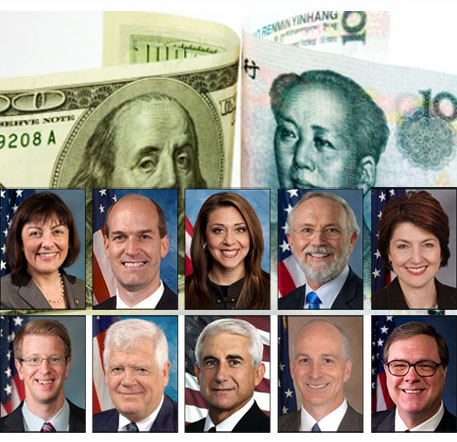NATIONAL
Trade deficits with TPP ‘partner’ nations cost 2 million U.S. jobs
By DAVID GROVES
The Stand
(March 4, 2016) — A new analysis released Thursday by the Economic Policy Institute reveals that trade deficits between the United States and the 11 other countries in the proposed Trans-Pacific Partnership cost 2 million U.S. jobs in 2015, more than half of which were in manufacturing. The report found that trade deficits with TPP countries cost jobs in every state, including trade-dependent Washington, which lost 17,800 jobs. The 3rd Congressional District, represented by Rep. Jaime Herrera Beutler (R), fared the worst in the state, losing 3,600 jobs.
 In Trans-Pacific Partnership, Currency Manipulation, Trade and Jobs, EPI Senior Economist Robert E. Scott finds that currency manipulation is one of the key factors behind the high and rapidly rising U.S. trade deficits with many TPP countries, including Malaysia, Singapore, and Japan. Without provisions against currency manipulation, which were deliberately omitted from the TPP, the EPI warns that this latest free-trade deal could follow the pattern from other NAFTA-like agreements and leave even greater U.S. trade deficits in its wake.
In Trans-Pacific Partnership, Currency Manipulation, Trade and Jobs, EPI Senior Economist Robert E. Scott finds that currency manipulation is one of the key factors behind the high and rapidly rising U.S. trade deficits with many TPP countries, including Malaysia, Singapore, and Japan. Without provisions against currency manipulation, which were deliberately omitted from the TPP, the EPI warns that this latest free-trade deal could follow the pattern from other NAFTA-like agreements and leave even greater U.S. trade deficits in its wake.
“The United States should insist that currency manipulation be directly addressed in the core of the TPP agreement,” Scott said.”We can’t afford a trade agreement that would weaken demand and cause more Americans to lose their jobs.”
Currency manipulation occurs when a nation deliberately undervalues its currency to artificially raise the price of U.S. exports and suppress the price of that nation’s imports into the United States. This manipulation closes opportunities for American businesses to sell their goods overseas while flooding the U.S. market with cheap goods. TPP nations Japan, Singapore, Malaysia — and other nations that could subsequently sign onto the TPP, such as China — have a history of egregious currency manipulation.
Majorities of both houses of Congress demanded that President Obama include in the core of the TPP “currency disciplines” that could be enforced with trade sanctions. But the president refused to even discuss those issues in the TPP negotiations.
 “Currency manipulation is (a) problem that remains unaddressed,” said Rep. Adam Smith (D-9th), in his statement announcing opposition to Fast Track Trade Promotion Authority for the TPP last year. “Until we find an effective way to ensure that other countries cannot devalue their currency to boost their exports, U.S. gains from trade will be limited. Finding a solution to currency manipulation matters to American workers and businesses. (The TPP) agreement does not address this issue in a meaningful way.”
“Currency manipulation is (a) problem that remains unaddressed,” said Rep. Adam Smith (D-9th), in his statement announcing opposition to Fast Track Trade Promotion Authority for the TPP last year. “Until we find an effective way to ensure that other countries cannot devalue their currency to boost their exports, U.S. gains from trade will be limited. Finding a solution to currency manipulation matters to American workers and businesses. (The TPP) agreement does not address this issue in a meaningful way.”
Twelve Pacific Rim nations representing 40 percent of the world’s economy signed the TPP in February. In addition to the U.S., they include Australia, Brunei, Canada, Chile, Malaysia, Mexico, New Zealand, Peru, Singapore, Vietnam and Japan. But the TPP must be ratified by Congress, without amendment to address currency manipulation or anything else, on a “fast track” up-or-down vote.
Meanwhile, bipartisan opposition to the TPP is growing. All of the leading contenders in the 2016 presidential race say they oppose the TPP as written. Concerns about the Investor-State Dispute Settlement process, which allows international corporations to challenge state and local laws, have cities around Washington considering resolutions in opposition to the TPP. Seattle and Spokane have unanimously passed such resolutions.
The new EPI analysis finds that every state, and all but two congressional districts, experienced job losses due to trade deficits with TPP countries in 2015. Seven of the 10 states with the highest losses as a share of total employment were in the Midwest or Southeast, in states where manufacturing predominates — especially of motor vehicles and parts. Michigan’s 11th congressional district was the hardest hit district in the country, losing 26,200 jobs, or 7.66 percent of total employment.
The EPI analysis concludes:
Even if the trade balance with the TPP remains stable, as assumed by the most optimistic proponents of the agreement, growing imports of labor-intensive products would over the next decade eliminate more than 400,000 U.S. jobs, reduce U.S. GDP by an additional one-half percent, and lead to growing income inequality in the United States and other members of the proposed agreement. Under a more likely scenario, the TPP would do that and more — fueling increased outsourcing, growing trade deficits, and even greater downward pressure on the incomes of working Americans…
Currency manipulation by members of the TPP and by neighboring countries such as China, South Korea, and Taiwan (who all may soon be invited to join the deal) would likely nullify any benefits the U.S. might achieve from the TPP, which will reinforce the negative consequences of the deal for working families and manufacturing communities in the United States and other member countries.
Congress should reject this agreement. The president can and should have done better for American workers, communities, and domestic businesses based in the United States.





